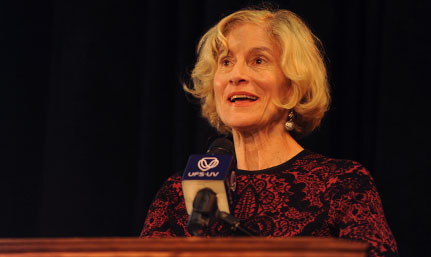Latest News Archive
Please select Category, Year, and then Month to display items
12 October 2020
|
Story Arina Engelbrecht
|
Photo Supplied
 Arina Engelbrecht from Organisational Development and Employee Well-being believes physical activity has a number of benefits for one’s health, including stress relief.
Arina Engelbrecht from Organisational Development and Employee Well-being believes physical activity has a number of benefits for one’s health, including stress relief.
Being physically active plays a big role in preventing the development of mental-health problems and in improving the quality of life of people experiencing mental-health problems.
Treatment for depression
Physical activity can be an alternative treatment for depression. It can be used as a stand-alone treatment or in combination with medication and/or psychological therapy. It promotes all kinds of changes in the brain, including neural growth, reduced inflammation, and new activity patterns are formed that promote feelings of calm and well-being. It releases endorphins – powerful chemicals in the brain that energise your spirit and make you feel good.
Physical activity can be very effective in relieving stress. Research in adults has found that physically active individuals tend to have lower stress levels compared to individuals who are less active. It also leads to improved sleep. When a person sleeps better and feels more rested, overall quality of life improves. They cope better with daily life stressors.
Reduce Alzheimer's risk
Regular physical activity can reduce your risk of developing Alzheimer's disease by up to 50%. It can also slow down further deterioration in those who have already started to develop cognitive problems. It stimulates the brain’s ability to maintain old connections as well as to make new ones.
A study asked people to rate their mood immediately after periods of physical activity (e.g. going for a walk/run, cycling, doing housework) and periods of inactivity (e.g. reading a book or watching television). Researchers found that participants felt more content, more awake, and calmer after being physically active compared to after periods of inactivity.
In conclusion, people who are physically active feel a sense of well-being, feel more energetic throughout the day, sleep better at night, have sharper memories, and feel more relaxed and positive about themselves and their lives.
“Being physically active not only changes your body, it changes your mind,
attitude, and your mood.” – Arina Engelbrecht
Prof. Martha Nussbaum visits Kovsies
2012-12-27
 |
Prof. Martha Nussbaum
Photo: Sonia Small
10 December 2012 |
The UFS community was privileged to gain insight into the brilliant mind of renowned philosopher Prof. Martha Nussbaum when she visited the Bloemfontein Campus.
Prof. Nussbaum, considered by some as one of the foremost living philosophers on the world stage, spent a week at the university interacting with staff, students and visitors from South Africa and abroad. The visit attracted huge interest, with people traveling from other parts of South Africa to hear Prof. Nussbaum speaking at public events held on the campus. International visitors attending the conference “Engaging the Other: Breaking Intergenerational Cycles of Repetition”on campus and scholars taking part in the Southern African Young Scientists Summer Program, also attended events.
Prof. Nussbaum’s first public event was on 6 December 2012 when the university honoured her with an honorary doctorate. She received a D. Litt degree for her intellectual and public contribution to human development. On 7 December 2012, she delivered a lecture on “Creating capabilities, the human development approach”. She also delivered a keynote address on the Political Role of the Arts as part of the conference on “Engaging the Other: Breaking Intergenerational Cycles of Repetition”.